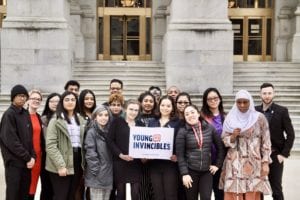
On June 30, New York City Mayor Bill de Blasio and the New York City Council voted on an $88-billion city budget for Fiscal Year 2021 (FY21). The budget — which is $7 billion less than the budget the Mayor proposed in January — passed in the midst of an ongoing pandemic, an economic crisis, and continued protests over police brutalizing Black and Brown people with impunity.
As New York City residents face rising unemployment, hunger, and housing insecurity, hundreds of thousands of New Yorkers urged city leaders to cut at least $1 billion from the New York Police Department’s budget, and reinvest it in youth programs, education, and housing. While the passed budget did reduce spending for the NYPD, ultimately it did not divest nearly as much from the NYPD’s budget as advocates urged.
With more young people engaged in this budget process than we’ve ever seen, Young Invincibles took a closer look to see how New York City’s next generation is supported in the City’s budget. Below are a few takeaways from the FY21 budget:
- City funding for CUNY ASAP is restored at $35 million: In April, the Mayor proposed a $20-million cut to CUNY’s Accelerated Study in Associate Programs (ASAP), CUNY’s signature free-college program that provides students with not only free tuition, but also a monthly MetroCard, increased access to academic counseling, and funding for textbooks. Research has consistently shown that enrollment in CUNY ASAP doubles graduation rates. Thanks to the advocacy of students, alumni, and counselors, the city’s FY21 budget restores funding for CUNY ASAP to $35 million.
Paola Cruz, a Columbia University student and an ASAP alum from LaGuardia Community College, shared her thoughts on the fight to restore ASAP:
“As New York City faces a real economic downturn, our city’s leaders should know that reducing programs like ASAP means making it harder for students like me to succeed. With everything that is happening right now, any possible threat to education, such as cuts on funding, would only be discriminatory to schools and students’ overall academic careers.”
- Funding for CUNY’s campus childcare funding is maintained: In FY19, the City Council increased funding for CUNY’s on-campus childcare facilities for the first time in nearly three decades. This year’s budget maintains funding for CUNY’s childcare centers at $510,000 — a 15 percent decrease from last year’s $600,000 investment in campus childcare.
- CUNY’s new food voucher program is funded: Last year, the City Council funded the new CUNY Food Insecurity Program, which provides eligible students with $400 in food vouchers each semester that they can use to buy food in campus cafeterias. The program also provided funding for CUNY’s on-campus food pantries. A little more than 1,500 CUNY students received vouchers through the Council’s program in the 2019-2020 academic year. As the COVID-19 pandemic closed physical campuses — including cafeterias — the Council moved from providing vouchers to sending participating students a $400 check that they can use for groceries. This may serve as a model for how CUNY administers this program if cafeterias remain closed.
- Some funding is restored for the Summer Youth Employment Program: Young people across New York City pushed back on proposed cuts to the city’s Summer Youth Employment Program (SYEP), which provides short-term, paid summer jobs for 14-24 year olds. The $115 million allocated for the program provides paid work for 35,000 young people — compared with years past, where 75,000 slots were funded.
